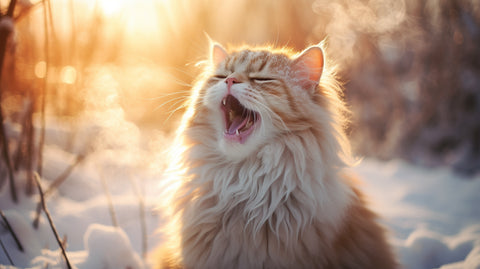Why Is My Cat Panting? Understanding the Causes and What to Do
Introduction
When you see your beloved feline friend panting, it can be a cause for concern. Cats aren't typically known for panting like dogs, and it might leave you wondering what's going on. In this article, we'll explore the various reasons behind why your cat might be panting and what you can do to help them.
What is Panting in Cats?
Before we dive into the causes, let's understand what panting in cats actually is. Panting is the rapid, open-mouthed breathing that helps regulate a cat's body temperature. It's a normal response to exertion or high temperatures, but if it becomes frequent or prolonged, it can be a sign of an underlying issue.

Common Causes of Cat Panting
1. Overexertion
Just like humans, cats can pant after strenuous physical activity. Whether they've been chasing toys, running around, or playing vigorously, panting can be a natural response. It's important to ensure they have access to water during and after playtime. Providing a cool, quiet place for them to rest is also essential to help them recover comfortably.
2. Heat Stress
Cats are more sensitive to heat than we often realise. Panting can occur if your cat is exposed to high temperatures, such as being left in a hot car or spending too much time in the sun. To prevent heat stress, always provide shade and fresh water for your cat, especially during the scorching summer months. Never leave cats (or other animals, for that matter) in a hot car.
3. Anxiety or Stress
Stress and anxiety can also lead to panting in cats. Changes in their environment, like moving to a new home or the introduction of a new pet, can trigger anxiety. Creating a calm and comfortable space for your cat, offering familiar objects and routines, can help alleviate stress-induced panting.
4. Respiratory Problems
Underlying respiratory issues, such as asthma or bronchitis, can cause panting in cats. If you notice your cat panting frequently, especially if it's accompanied by coughing or wheezing, it's crucial to consult your veterinarian promptly. They can provide a proper diagnosis and recommend appropriate treatment to manage the condition effectively.
5. Heart Issues
Heart conditions can lead to inadequate oxygen supply in the cat's body, forcing them to pant as they try to compensate. This is a serious concern and requires immediate veterinary attention. Your vet can assess your cat's heart health and provide a treatment plan tailored to their specific needs.
6. Obesity
Overweight cats are more likely to pant, particularly during physical activity, due to the added strain on their heart and lungs. To address this, it's essential to ensure your cat maintains a healthy weight through a balanced diet and regular exercise. Consult your vet for guidance on a suitable weight management plan.
7. Allergies and Respiratory Irritants
Allergies or exposure to irritants like smoke or strong odours can lead to panting in cats. To reduce panting episodes, identify and eliminate potential allergens in your cat's environment. This may involve keeping their living area clean and free from irritants. If you notice this, you may want to try natural cleaning products (as opposed to those laden with chemicals) as these may help to reduce your cat's exposure to substances which cause an allergic or inflammatory response.
8. Poisoning
Ingesting toxic substances can result in panting, along with other severe symptoms. If you suspect your cat has ingested something harmful, contact your vet immediately or seek emergency care. Quick action can be life-saving in cases of poisoning.
Understanding these common causes of cat panting can help you take appropriate measures to ensure your feline companion's health and well-being. Always monitor your cat's behaviour and seek professional advice when needed.
What to Do When Your Cat is Panting
If your cat is panting excessively or if you notice any other concerning symptoms, it's crucial to take action:
1. Stay Calm: When you notice your cat panting, it's essential to remain calm. Cats can sense your emotions, and if you're anxious or stressed, it may exacerbate their own stress levels. Speak to your cat in soothing tones and provide a reassuring presence to help them relax.
2. Provide Water: One of the first steps you should take is ensuring your cat has access to fresh water. Panting can lead to dehydration, especially in hot weather. Make sure there's a bowl of clean, cool water nearby for your cat to drink from.
3. Cooling Measures: To help your cat cool down, you can use a damp cloth. Gently wipe their fur with the cloth, particularly on their paws, underarms, and neck. Alternatively, you can place your cat in a cooler room with good ventilation and shade. Avoid using ice or very cold water, as it can shock their system.
4. Visit the Vet: If your cat's panting persists or if it's accompanied by other worrying symptoms such as coughing, wheezing, lethargy, or disorientation, it's crucial to consult your veterinarian without delay. These signs might indicate underlying health issues, such as respiratory problems or heart conditions, which require professional diagnosis and treatment. Your vet can provide a tailored plan to address the specific cause of your cat's panting and ensure their well-being.
Taking these steps promptly can help alleviate your cat's discomfort and ensure their health and safety. Always remember that your veterinarian is your best resource when it comes to your cat's health concerns.
Conclusion
Understanding why your cat is panting is essential for their well-being. While some instances of panting are normal, others may indicate underlying health issues. Pay close attention to your feline companion's behavior, and don't hesitate to seek professional advice if needed.
FAQs
1. Can I use a fan to cool my panting cat?
Yes, a gentle fan can help cool your cat down, but ensure it's not too strong or directly blowing on them.
2. How can I reduce my cat's stress-induced panting?
Creating a calm and consistent environment, using pheromone diffusers, or consulting with a veterinarian for anxiety management techniques can help.
3. Is panting in cats ever a medical emergency?
Yes, panting can be a sign of a serious medical issue, especially if it's accompanied by other concerning symptoms. Seek immediate veterinary care in such cases.
4. Can I give my cat human asthma inhalers for panting?
No, never administer human medication to your cat without a veterinarian's guidance. Cats require specific medications and dosages tailored to their needs.
5. What should I do if I suspect my cat has ingested something toxic?
Contact your veterinarian or an emergency pet poison hotline (01202 509000 - UK, 855-764-7661 - US) immediately for guidance on how to proceed.
Join the Cooper and Gracie Family: Discover a World of Pet Care Excellence!
At Cooper and Gracie, we're more than just a pet care brand; we're a family dedicated to ensuring the well-being of your furry friends. With our passion for animals and our commitment to providing top-notch products, we invite you to become a part of our extended family.
Experience the difference with our premium cat care solutions, meticulously crafted to meet the unique needs of your beloved companions. From luxurious grooming products to innovative health solutions and supplements, we've got you covered. We believe in transparency, quality, and putting your pets first in everything we do.
Join us in making a positive change in your pet's life. Together, we can ensure they lead a healthy, happy, and thriving life. Shop now at CooperandGracie.com and embark on a journey of excellence in pet care. Your furry family members deserve nothing but the best, and that's exactly what we provide. Trust in Cooper and Gracie – where pets come first, always.

